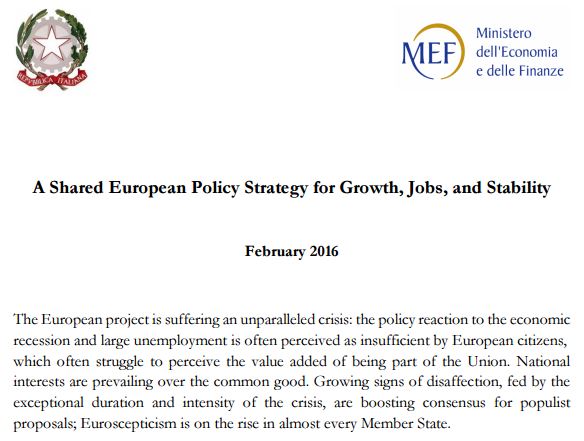Using all the Budget spaces to support growth, the completion of the ‘ Banking Union with Common Guarantee Fund deposits , Minister of European Finance with its own budget, shared management of emergency migrants. The Italian Government, in a position paper sent to Brussels, puts on paper all its strong points for a European policy that looks to growth and employment, because, underline from Palazzo Chigi and the MEF, bazooka the ECB alone can not . “The European project is suffering an unprecedented crisis”, says the document, “the EU’s policy response to the recession and unemployment is often perceived as insufficient by European citizens”, while there is growing consensus for “populist proposals” and rampant the Euroscepticism. “If Europe is to be part of the solution, not the problem, we need to rebuild trust between our citizens and between member states and develop a common strategy to support growth and jobs.”
the Italian plan to change Europe
the recipe of the Italian government to achieve this objective is based on the use “of all budgetary space” available, since, “in the presence of a prolonged modest rate of growth and exceptionally low inflation also the extraordinary measures put in place by the ECB is proving inadequate.” At the same time, back to grow and create jobs “it is also the most effective way to keep the debt on a sustainable path”. There is also the proposal of Eurobonds for the expenses of the refugees:
Confirmed the proposal of a European fund to combat unemployment the government, yet critical of the Directive on bailouts , renews calls for completion banking Union with a European deposit insurance scheme, and to provide financial support for the Fund of bank resolution. At first, the government suggests, resources could come by the ESM, the Fund bailout that in perspective “could be transformed into a European Monetary Fund ‘, even if the 700 billion which the ESM features are’ calling, “and not subscribed by the Member States.
the last chapter of the document is devoted to the tools to manage the exceptional wave of immigrants and refugees. “The Schengen Agreement is one of the main achievements of European integration and needs to be preserved and strengthened,” writes the government, calling for the sharing of the burden. Even with a “financial initiative at Union level, intended to finance the common management of external borders.”
Italy then reiterates the need for “greater symmetry” in macroeconomic adjustments required member states: “Important current account surplus,” says the paper, “have an equally negative impact on the overall operation of large eurozone deficit”. In other words, the exorbitant trade surplus in Germany is detrimental to Europe as the Italian debt. One approach ‘more’ cooperative ‘in supporting investments would lead to a “win-win balance.” To this end it would be useful to establish a “European Minister of Finance” that can promote “common budgetary policies and ensuring the aggregate level consistent pursuit of goals and internally balanced.” The Minister should have available a “just budget with adequate resources.” Another piece of Italy to the EU proposed strategy is completion Banking Union through the creation of a common guarantee fund for deposits that “significantly improve the functioning”, ensuring more efficiency and established ” and ‘supporting confidence “in the system. “The innovations put in place by the implementation of the EU Directive Brrd are substantial and will take some time because the expectations and behaviors of stakeholders to adapt to the new structure,” reads the position paper.

The Italian Position Paper on the EU
The fund
for the protection of deposits
“the implementation must be managed properly to avoid financial instability through better information, communication, transparency and risk assessment”. In parallel “further measures are necessary to reduce high levels of private debt, to address the issue of non-performing loans and improve overall efficiency of the insolvency regime.” “A common response” ultimately requires emergency migrants, which represents for the European Union “an unprecedented challenge.” Italy returns to urge “a sharing of responsibility ” between the EU and member states more ‘exposed’ in the management of external borders”. An effort that would require “several sources of financing” and justify “the use of mutual aid modalities, which could include the issuance of common bonds.” The Schengen agreement, says the paper, “is one of the most ‘important results of the European integration process must be preserved and strengthened.” Republic reports the analysis of the background details:
And yet, the need to transform the fund-saving states (ESM) into a European Monetary Fund to protect the currency and their countries from economic shocks. But it would also serve a eurozone budget (Fiscal capacity) with a stabilizing function, promotion of investment and financing of national policies (reforms) that bring benefit to other countries. Italy is also not opposed to a European finance minister, member of the Commission, provided that “has a strong connection with the European Parliament.”
So not a super-bureaucrat who apply the rules blindly but a politician who responds in front of his classroom policies of Strasbourg. For the Government, finally, many of the proposals can already be substantiated ‘with the existing Treaty’. And by the way the changes they arrived in the medium term may be “support for changes to the Treaties when they are needed.”
No comments:
Post a Comment